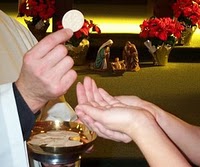Over the summer, while I was working in DC, I decided to visit every church within walking distance of the place I was living, so I saw a wider variety of services that the Catholic Mass I attend every week with my boyfriend. This led to a whole new range of stresses for me.
Whenever I enter a new religious ceremony, especially if unescorted by an initiate, I immediately become convinced that there is a giant blinking sign above my head that says ATHEIST, and that I will somehow manage to do something incredibly disrespectful out of ignorance. This problem was probably at its worst when I stared attending Mass with my boyfriend last January. I had never been to religious ceremonies before, and I still had a room-shaking cough from my bout with pneumonia, and I didn’t even know which parts were most acceptable to time my coughs for.
But in DC, I had a new problem. Once I was at non-Catholic ceremonies, I had to make a choice about open communion. Catholics restrict the Eucharist to people in communion with the Catholic Church whose souls are in a state of grace, so I’m disqualified on a variety of levels, naturally. Even more ecumenical traditions often limit the Eucharist to baptized Christians, so, again, I’m out. However, over the summer, I was in several churches where I was both allowed and encouraged to receive communion if I wanted. I declined every time, but I was torn, and I’m still not sure what the appropriate choice would have been.
I certainly wouldn’t go up to the rail if my presence would be disruptive or disrespectful. I declined to participate because I didn’t think I was capable of participating respectfully. Even if I were outwardly respectful, I’d still be participating in a ceremony I didn’t believe in. I’d still be receiving a cracker, not the Host. It seems wrong for me to go through the motions when that’s not how the ceremony is meant to be treated.
On the other hand, [caveat: I have an extremely imperfect knowledge of the theology of the various Christianities that practice open communion] I am under the impression that some groups believe that Communion can have a salutary effect, even if it is taken by non-Christians. In that case, my decision to hang back is a choice to withdraw from the possible influence of their God and in conflict with whatever attitude of openness I was supposed to be cultivating by attending in the first place.
After all, the church that offered me communion (even after I stated I was an unbaptized unbeliever) was Episcopal. The official position of the Episcopal church is closed communion, as far as I can tell. So this parish like some others in America had made a deliberate choice to open their communion. I was opting out of what is, from their perspective, a gift they wished to give me.
I’d be very curious what any of you think is appropriate in these situations.
Does my unbelief (and implicit disrespect) trump their desire to offer me fellowship?
Am I being too closed off by refusing to participate, since I don’t believe it will do me any harm?
Does your answer to the dillema change if I am invited to come to the rail to ‘receive a blessing’ instead of partaking in the Eucharist? This is the practice of the campus ecumenical service. I opt out there as well.

















